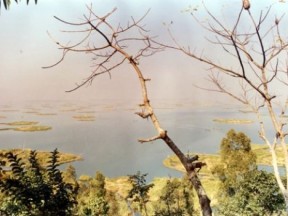The State government in Manipur is forcefully evicting families living on Loktak. Since Tuesday, the State police has used brute force to chase alleged illegal settlers away from their homes, including burning nearly 200 huts. It is being alleged that the eviction is in fact a security operation, and not to preserve the environment under the controversial Loktak Lake (Protection) Act, 2006, as claimed.
State government officials started burning down floating huts, khangpokshang, built over (floating plant mass) of the fishermen living in the Loktak wetlands in central Manipur on Tuesday. The officers from the Loktak Development Authority (LDA) and the Manipur state police carried out the burning down of the huts. The LDA had earlier issued an eviction notice to the residents on November 11. Nearly 200 floating huts had been already burnt by Thursday, and the remaining 1,132 floating huts are to meet a similar fate. There are about 5,000 persons living in these floating huts located in Khuman Yangbi, Nambul Machin and Karang Sabal areas within the Loktak Lake.
The burning down of the floating huts is in accordance with the provisions of the controversial Loktak Lake (Protection) Act, 2006, in particular Section 19 and 20 of the Act, which divides the 236.21 sq km Loktak Lake into two zones – a core zone comprising 70.30 sq km, which is a ‘no development zone’, or ‘totally protected zone’, and a buffer zone of other areas of the lake excluding the core zone. A vital aspect of this division is the prohibition on building huts or houses on phumdis inside the lake, or athaphum fishing, a destructive form of fishing using vegetation enclosures in the core area. This however, will adversely affect over 10,000 people living in phumdi huts, as well as others dependent on the lake.
The eviction has led to the displacement of nearly 950 community members so far who have been living in these floating huts for generations. The number of affected families is expected to increase since the burning down of huts is still continuing. The victims, including women, children and the aged have sought refuge at the Ningthoukhong Makha Leikai community hall in Bishenpur district. The fishing gears and nets of the communities, their only means to catch fish from the Loktak wetlands, were also burned. This has left the community having no means to find food for survival. Having lost all their belongings, including books, uniforms and school bags, many children can no longer go to school. With the winter already setting in Manipur, the displaced villagers are left to fend for themselves during the harsh weather.
Each household was offered Rs 40,000 as compensation before their huts were burned. However, most of the villagers rejected this amount as too meagre. The Manipur police commandos were alleged to have threatened and intimidated the affected villagers before burning down their huts. In many cases, the police also forced the displaced family members to burn their own huts.
Affected peoples on several occasions had been raising vehement opposition to the introduction of the controversial Loktak Protection Act, 2006, which they feared would break the age-old bond between the lake and its people. Indigenous peoples depending on the Loktak Lake for survival continue to demand the complete scrapping of the Act.
The state government, through the LDA has been blaming the indigenous peoples dwelling in Loktak for polluting and causing contamination of the lake. However, the impact of the Ithai Barrage of the Loktak Multipurpose Hydroelectric Project, commissioned in 1984, which led to a large scale devastation of the Loktak wetlands ecosystem, loss of indigenous plant and faunal species, disturbance of the wetlands’ natural balance and cleansing system leading an accumulation of pollutants in the lake, has been ignored.
There is no comprehensive government policy to protect the environment in Manipur. Under the pretext of protecting wetlands to mitigate climate change and also to conserve wetlands, there is an increasing effort to evict poor fishermen and villagers who depend on the Loktak Wetlands and Lamphelpat Wetlands. The Loktak Wetlands Ecosystems has already been destroyed by the Loktak Multipurpose Hydroelectric project.
Furthermore, the government has been adopting an indiscriminate policy of converting the Lamphelpat Wetlands for heavy and widespread construction, including several government offices, military camps, Imphal Sewerage Treatment Plant, National Information of Technology buildings, National Games village, Langol Housing complex and the Police Housing complex, all of which has led to widespread destruction of the Lamphelpat Wetlands.
This article was originally written for the Deadline Delhi column in Asian Correspondent. It has been reproduced here with the author’s permission. Subir Ghosh blogs at www.write2kill.in.






